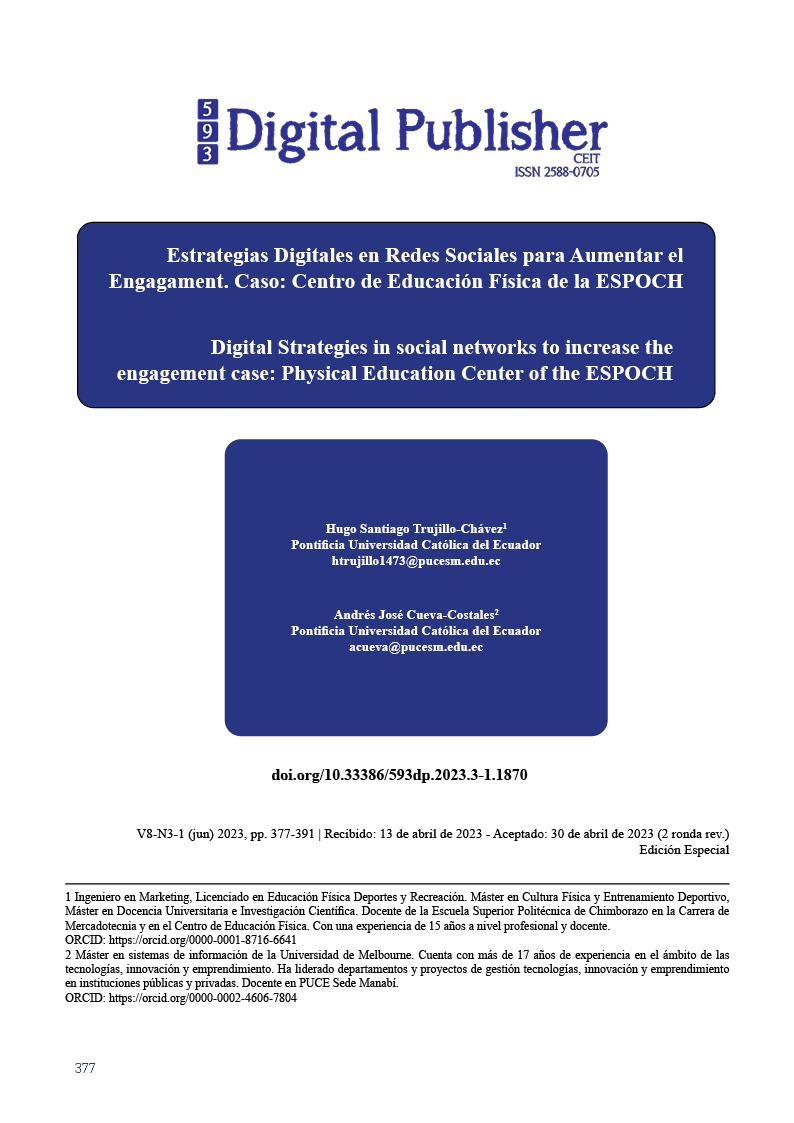Digital Strategies in social networks to increase the engagement case: Physical Education Center of the ESPOCH
Main Article Content
Abstract
Social networks are fundamental tools for sports organizations to connect with their target audience, allowing them to generate greater engagement in their current and potential customers to convert them into fans of the brand. The purpose of this research was to identify the digital strategies in social networks used by the Physical Education Center (CEF) of the Polytechnic School of Chimborazo (ESPOCH) and their engagement. With the application of a mixed approach, 420 students and 2 digital marketing experts in sports organizations were surveyed and interviewed respectively. The results obtained show that the social network most used by ESPOCH students to find out about sports news is Facebook, however, the use of other social networks is required to show specific content in relation to a certain topic. In addition, generating content marketing in a certain social network will increase the visibility of a brand by generating valuable and attractive content with constant interaction which allows raising the level of engagement. The information found is a significant contribution for sports organizations when publicizing their services or events through social networks to generate an adequate engagement with their target audience.
Downloads
Article Details

This work is licensed under a Creative Commons Attribution-NonCommercial-ShareAlike 4.0 International License.
1. Derechos de autor
Las obras que se publican en 593 Digital Publisher CEIT están sujetas a los siguientes términos:
1.1. 593 Digital Publisher CEIT, conserva los derechos patrimoniales (copyright) de las obras publicadas, favorece y permite la reutilización de las mismas bajo la licencia Licencia Creative Commons 4.0 de Reconocimiento-NoComercial-CompartirIgual 4.0, por lo cual se pueden copiar, usar, difundir, transmitir y exponer públicamente, siempre que:
1.1.a. Se cite la autoría y fuente original de su publicación (revista, editorial, URL).
1.1.b. No se usen para fines comerciales u onerosos.
1.1.c. Se mencione la existencia y especificaciones de esta licencia de uso.
References
Ballesteros, C. (2018). engagement-en-redes-sociales_razón-y-palabra_vol22_2018. Razón y Palabra, 22(102), 96–194. http://revistas.comunicacionudlh.edu.ec/index.php/ryp
Berenguer Berenguer, J. A. (2019). Redes sociales y marketing 2.0. COMM092PO. (IC, Ed.; Primera).
Bruns, A., & Burgess, J. (2015). Twitter Hashtags from Ad Hoc to Calculated Publics 1. http://eprints.qut.edu.au/46515/.
Cupido Navarro, A., & Suárez Lantarón, B. (2022). Uso de las redes sociales por el alumnado universitario de la Facultad de Educación (Universidad de Extremadura). Innoeduca. International Journal of Technology and Educational Innovation, 8(2), 97–113. https://doi.org/10.24310/innoeduca.2022.v8i2.13719
Galán-Ladero, M. M., & D.-M. M. (2020). El papel de los influencers en el marketing deportivo digital: el caso de la NBA en Instagram.
Gálvez Clavijo, I. (2015). Facebook para empresas y emprendedores.
Herencia, B. C. A. (2019). Digital representation of engagement: Towards a perception of commitment through symbolic actions. Revista de Comunicacion, 18(1), 215–233. https://doi.org/10.26441/RC18.1-2019-A11
Hernández, F. (2001). Investigación documental y comunicación científica (UAPA, Ed.).
Hernández León, R. A. (2011). El proceso de investigación científica (Universitaria, Ed.; Primera).
Herrera-Torres, Pérez-Tur, García-Fernández, J., & Fernández-Gavira, J. (2017). El uso de las redes sociales y el engagement de los clubes de la Liga Endesa ACB The use of social networks and Engagement of ACB Endesa League A utilização de redes sociais e o Engagement dos clubes na Liga Endesa ACB. 17, 175–182. http://revistas.um.es/cpd
Kaplan, A. M., & H. M. (2010). Users of the world, unite! The challenges and opportunities of Social Media. Business Horizons.
Kepen, D. (2020). Me gusta: redes sociales, cómo atraer clientes y crear una marca atractiva para las redes sociales (McGraw Hill, Ed.; Primera).
Marqués, P. y F. M. D. (2015). Conectados por redes sociales: introducción al análisis de redes sociales y casos prácticos (UOC., Ed.; primera edición).
Ortega, A. O. (2018). ENFOQUES DE INVESTIGACIÓN. https://www.researchgate.net/publication/326905435
Perez, L. P. R. y S. M. V. (2020). Metodología de la investigación científica (Maipue, Ed.).
Pew Research Center. (2021). Social Media Fact Sheet.
Sanagustín, E. (2016). Vender más con marketing digital (Ecoe, Ed.; Primera).
Serrano, J. (2020). Metodologia de la Investigacion edicion Gamma 2020: 1er semestre Bachillerato General.
Serrano-Cinca, C., G.-T. D., & C.-F. B. (2017). Redes sociales y marketing deportivo: análisis de la presencia de los clubes españoles de fútbol en Facebook. Revista de Investigación En Marketing e Innovación, 75–92.
Shum Xie, Y. M. (2019). Marketing digital: navegando en aguas digitales (De la U, Ed.; 2 da).
Sociedad, U. Y., Hernán, W., Urcos1, C., Ticlla1, F. R., Francisco, J., Nora, C., Cipriano, C., & Montesinos, Z. (2022). Volumen 14 | Número 4 | Julio-Agosto.
Tejedor, S., Cervia, L., & Vecino, C. (2020). El fútbol en las redes sociales: análisis de la presencia en facebook de los principales equipos de Europa. Revista Iberoamericana de Psicología Del Ejercicio y El Deporte, 15(3), 3.
Valls Arnau, M. (2016). Las redes sociales: herramienta de gestión empresarial (Ugerman, Ed.; Primera).



